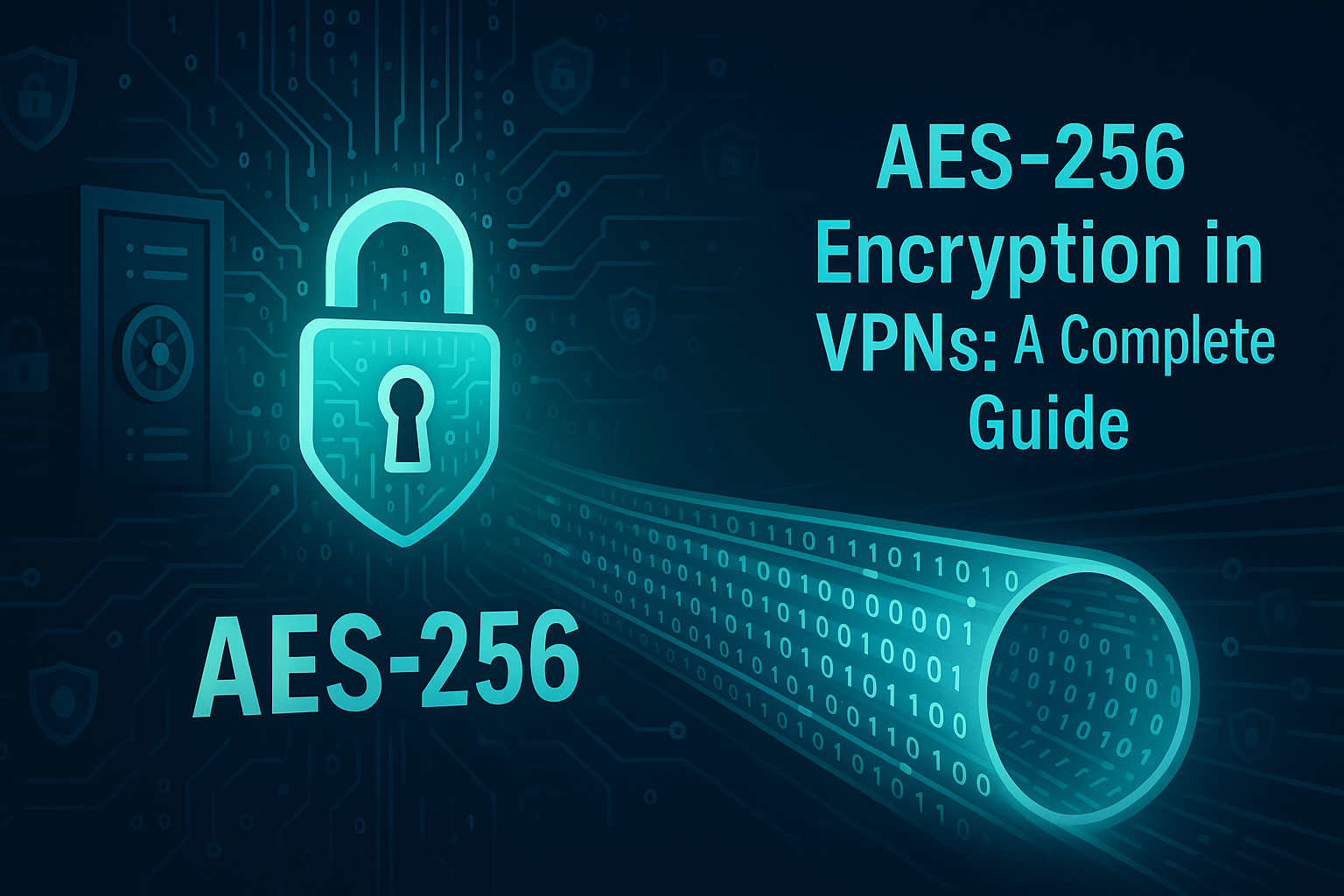AES-256 (Advanced Encryption Standard with a 256-bit key) is a symmetric encryption algorithm used globally for securing data transmissions. Developed by the U.S. National Institute of Standards and Technology (NIST), AES-256 is widely implemented in VPNs due to its high level of security and efficiency. Its strength lies in its ability to withstand brute-force attacks, as the vast number of possible key combinations makes it virtually impossible to crack.
This encryption method follows a systematic process where plaintext data is transformed into ciphertext using a series of complex operations. The process involves key expansion, substitution, permutation, and multiple rounds of encryption to ensure data remains secure. Unlike older encryption methods, AES-256 is designed for both speed and security, making it an ideal choice for real-time applications like VPNs.
Why AES-256 is Essential for VPNs
VPNs (Virtual Private Networks) play a crucial role in protecting online privacy by encrypting internet traffic. Without encryption, internet activities can be monitored, intercepted, or altered by third parties such as hackers, ISPs, or government agencies. AES-256 ensures that all transmitted data remains scrambled and unreadable to unauthorized entities. Even if an attacker were to capture VPN traffic, decrypting AES-256 encrypted data without the corresponding key would be practically impossible.
Beyond privacy, VPNs with AES-256 encryption provide a secure environment for accessing sensitive information over public networks. Whether connecting to public Wi-Fi or bypassing geo-restrictions, users benefit from the highest level of security available, minimizing the risks of cyber threats like man-in-the-middle attacks and data breaches.
How AES-256 Encryption Works
The AES-256 encryption process consists of multiple transformation steps that convert plaintext into ciphertext. First, the original key is expanded into a set of round keys that will be used throughout the encryption process. Then, data undergoes a substitution step, where each byte is replaced with a corresponding value from a predefined S-box, ensuring confusion. This is followed by shifting rows and mixing columns, which increase diffusion by altering data structure at the bit level. Finally, encryption is repeated over 14 rounds, with each round applying the same transformations, reinforcing security at every step.
The final ciphertext can only be decrypted using the correct key, ensuring that unauthorized entities cannot access the original data. AES-256 is highly efficient, balancing security and speed without causing significant performance slowdowns, which is crucial for VPN applications.
Benefits of AES-256 in VPNs
AES-256 encryption is widely regarded as unbreakable by conventional means, making it the preferred standard for secure communications. Its extensive key length makes brute-force attacks infeasible, as it would take billions of years for even the most powerful supercomputers to break a 256-bit encryption key. This level of security has made AES-256 the encryption choice for government agencies, financial institutions, and security-focused organizations worldwide.
Beyond security, AES-256 also ensures data integrity, meaning that any attempt to alter encrypted data will be detected. This prevents unauthorized modifications, making it ideal for secure transmissions. Moreover, VPN services that implement AES-256 allow users to maintain complete privacy by preventing third-party tracking and surveillance.
AES-256 vs Other Encryption Standards
Compared to other encryption standards, AES-256 stands out as the most secure and widely used option. AES-128, which uses a shorter key length, is still considered secure but is more vulnerable to potential brute-force attacks. AES-192 offers a middle ground, with enhanced security over AES-128 while maintaining reasonable efficiency.
Despite these differences, AES-256 remains the most future-proof option, as it offers the highest level of security while being optimized for modern computing architectures. With the growing concerns over quantum computing, AES-256 provides a strong foundation for long-term cryptographic security.
VPN Protocols That Use AES-256
Several VPN protocols rely on AES-256 encryption to ensure secure communications. OpenVPN is one of the most popular and trusted VPN protocols, utilizing AES-256 in both UDP and TCP modes for optimal security and reliability. Another protocol, IPsec/IKEv2, is commonly used in corporate environments and mobile networks, providing robust encryption with fast reauthentication capabilities.
While WireGuard, a newer VPN protocol, primarily uses ChaCha20 encryption, some implementations allow for AES-256 integration. Similarly, L2TP/IPsec combines the Layer 2 Tunneling Protocol with AES-256 encryption to provide an extra layer of security, particularly when used on older systems.
Is AES-256 Unbreakable?
Although no encryption is truly unbreakable in theory, AES-256 is practically impossible to crack using current technology. A brute-force attack on AES-256 would require testing 2256 different keys, which exceeds the computational capabilities of any modern system. Even with the potential advancements in quantum computing, AES-256 remains resistant due to its extensive key size and structured encryption rounds.
That said, the effectiveness of AES-256 depends on proper key management. Weak passwords, poor implementation, or exposure of cryptographic keys can compromise security. This is why reputable VPN providers implement stringent authentication measures alongside AES-256 encryption.
How to Ensure AES-256 VPN Security
To maximize security when using a VPN with AES-256 encryption, it is essential to choose a reputable VPN provider that correctly implements encryption standards. Not all VPN services configure AES-256 properly, so conducting research and verifying encryption protocols is crucial.
Additionally, using strong authentication mechanisms, such as SHA-512 for hashing, enhances overall security. Features like a kill switch ensure that if the VPN connection drops unexpectedly, no unencrypted data is exposed. Furthermore, avoiding outdated VPN protocols and sticking with modern standards like OpenVPN and WireGuard can help maintain a high level of security.
Conclusion
AES-256 encryption remains the cornerstone of VPN security, offering unparalleled protection against cyber threats and unauthorized access. Its strength, efficiency, and reliability make it the preferred encryption standard for safeguarding internet communications. By choosing a VPN that correctly implements AES-256 and following best security practices, users can ensure their online activities remain private and secure from external threats.




![Unraid VPN Setup – Secure NAS Access [year] 7 Best VPN for Unraid 2025: Secure Remote Access for Your NAS](https://vpntrends.org/wp-content/uploads/2025/02/78b24dac-4ebf-4099-989e-a8a70817534e-150x150.png)
![Match.com VPN Access – Secure Dating Safely [year] 7 Best VPN for Match.com [year]: Secure & Private Online Dating](https://vpntrends.org/wp-content/uploads/2025/02/Best_VPN_for_Match_com-150x150.jpg)
![Security Camera VPN – Protect Remote Monitoring [year] 7 Best VPN for Security Cameras [year]: Secure Monitoring](https://vpntrends.org/wp-content/uploads/2025/02/Best_VPN_for_Security_Cameras-150x150.jpg)
![TextPlus VPN Access – Private, Secure Messaging [year] 7 Best VPN for TextPlus [year]: Secure Access and Privacy](https://vpntrends.org/wp-content/uploads/2025/02/Best_VPN_for_TextPlus-150x150.jpg)
![Warzone VPN Access – Easier Lobbies, Fast Play [year] 7 Best VPN for Warzone for Easier Lobbies 2025](https://vpntrends.org/wp-content/uploads/2025/02/05b2a1a6-c620-4dd2-8dc6-e745b0364ef0-150x150.png)
![Synology NAS VPN – Secure Remote Access [year] Synology NAS VPN – Secure Remote Access [year]](https://vpntrends.org/wp-content/uploads/2025/02/nordvpn-website-1024x441.jpg)

